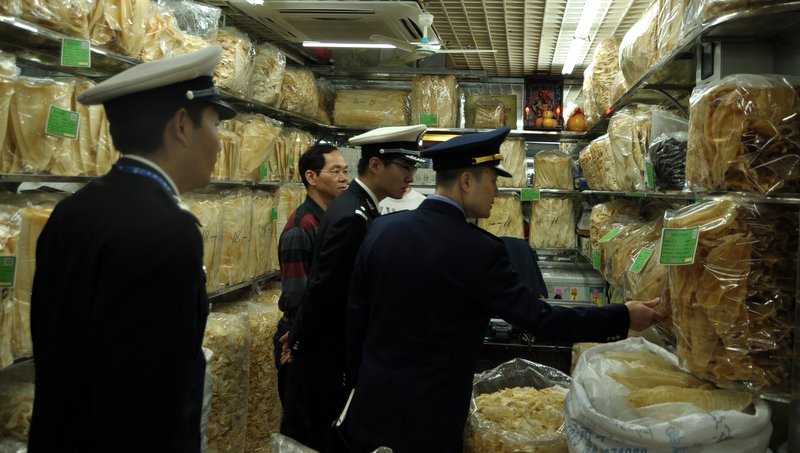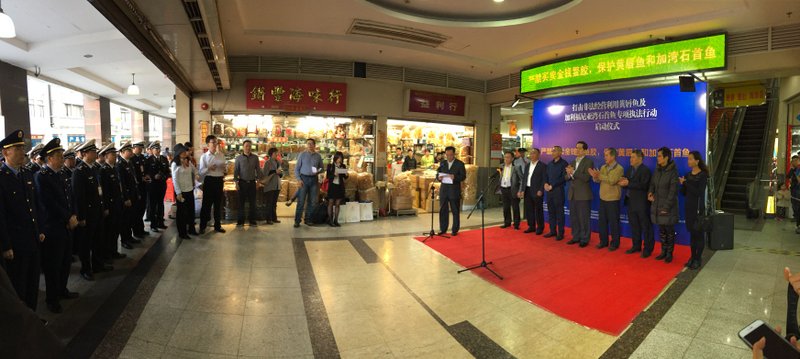(January 9, 2017) China is vowing to strictly enforce its regulations to combat illegal commercial activity in endangered species. Today, Bureau of Fisheries of Ministry of Agriculture (BOF), Market Management Department of State Administration for Industry and Commerce (SAIC), and Chinese CITES Management Authority (CNMA), hosted a launch ceremony for new actions to combat the illegal sales of fish maw from protected species, the Chinese Bahaba (Bahaba taipingensis) and the Totoaba (Totoaba macdonaldi) . This ceremony will kick off the intensive enforcement action on illegal fish maw along with increased public awareness and education in Guangdong Province.
A diverse range of groups and agencies attended the event including local industry and commerce and fisheries management departments, CNMA, Guangzhou Customs, WildAid, the Natural Resource Defense Council (NRDC), Alibaba, Tencent and Guangzhou Dried Seafood and Nut Industry Association. Dr. Meng Xianlin, the standing deputy director of CNMA, Liu Hongwei, the deputy director of Market Management Department of SAIC, Wu Dawei, the vice-director of the Enforcement Department of Guangdong Fishery, Wang Juan, Senior Program Officer of WildAid, representative from Alibaba addressed in the event. The ceremony was presided over by Ding Xiaoming, deputy director of BOF.
The Chinese Bahaba is a national level II protected species, and commercial harvesting of the fish is illegal. Its fish maw (swim bladder, market name Jin Qian Min Yu Jiao) is considered a delicacy that fetches extremely high prices. Totoaba is an endangered species that only found in Mexico’s Gulf of California. It has been protected under CITES appendix I since 1976 and any commercial trade in the species is strictly prohibited. For many years, the totoaba has faced serious threats from habitat destruction and overfishing, seeing steady declines in its wild populations. In recent years, Totoaba fish maw has been considered as a substitute to that of the Chinese Bahaba and the smuggling of Totoaba and its fish maw is contributing to its declining populations. At the CoP17 of CITES in October 2016, new decision was adopted to increase protection for the totoaba and strengthen enforcement to combat the illegal fishing and illegal trade. Report to CITES Secretariat on relevant enforcement is also required.
As the first concrete step toward fulfilling CITES commitment, BOF, SAIC and CITES organized an enforcement training workshop in Guangzhou in last December. About 100 enforcement officers from fisheries, market control, customs, and coast guard in Guangdong province attended the workshop, where they learned more about CITES decisions, identification skills, and how to better combat the illegal trade of totoaba fish maw. Customs and CITES officials from Hong Kong SAR of China, government representatives from Mexico and the U.S. and experts from NGOs also attended the workshop.
After the training workshop, local authorities of Fisheries, SAIC and CNMA have made action plan and required cities in Guangdong Province to set up taskforce and enforcement teams to inspect the regional dried seafood markets. Information and posters to protect totoaba and bahaba will be distributed in these markets. China’s main online platforms Alibaba and Tencent will also support the action by monitoring and reporting relevant illegal trade of these products, and to call for more online market suppliers to stop selling the illegal products. Right after the launch ceremony, Guangzhou enforcement officials began to inspect 8 major dried seafood markets in the city.
Ding Xiaoming, deputy director of the Bureau of Fisheries of Ministry of Agriculture noted “this enforcement action shows our commitment to the CITES agreements and the US-China Strategic and Economic Dialogue framework to combat illegal trade in endangered species through strengthening our multi-agency enforcement and assist in the protection of species like the Chinese Bahaba and Totoaba.”
Liu Hongwei, deputy director of the State Administration for Industry and Commerce Market Management Department noted that “only by multiple agency cooperation can we effectively enhance wildlife protection. And the skills and experience of our agency will play a major role in helping combat this illegal behavior.”
“This is the first such major multi-agency enforcement action to address an international convention obligation on trade in non-native CITES appendix species. It shows, once again, that China is firmly committed to combat illegal trade in endangered species”, notes Dr. Meng Xianlin of CITES, “and to truly solve the problem of illegal trade in Totoaba, we also need collaboration efforts from Mexico and the US in terms of source conservation and interim regulation.”
“Chinese Bahaba and Totoaba are endemic species to China and Mexico respectively, and Vaquita (Phocoena sinus) is critically endangered,” said Steve Blake, Acting Chief China Representative of WildAid, “We are thrilled to see governments taking such strong action to protect this endangered wildlife through strengthening enforcement and increase awareness campaigns.”
Hua Ning, NRDC Wildlife Specialist, noted “we’re glad to see that the government has organized the intensive enforcement action only a month after the training workshop, right before Spring Festival. This is vitally important to protecting the Totoaba and likewise the Vaquita. We also expect Mexico and the US to take more efforts in source conservation and interim regulation to save these endangered species..”
On January 1, 2017 the newly updated wildlife protection law in China have taken effect. According to the law, illegal hunting, fishing, processing, and consumption of nationally protected wildlife species will be punished by the government authorities. The product and income will be confiscated, together with a penalty of two to ten times of its value. Serious violators whose behavior constitutes a criminal offense will be investigated for criminal responsibilities.





